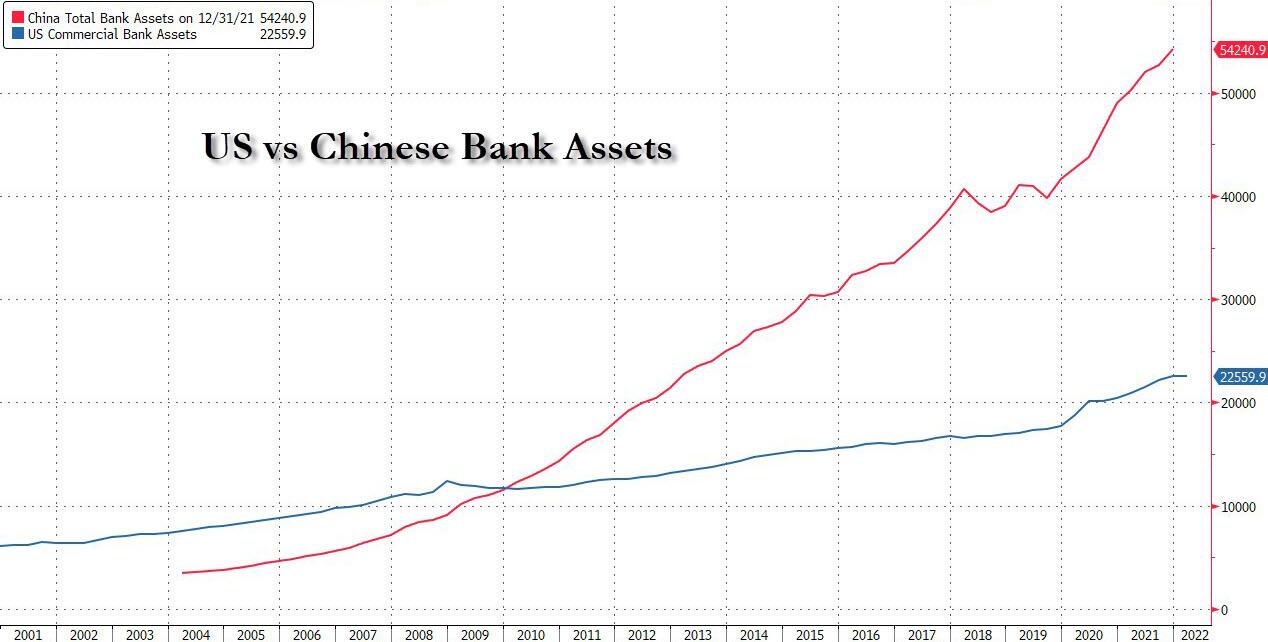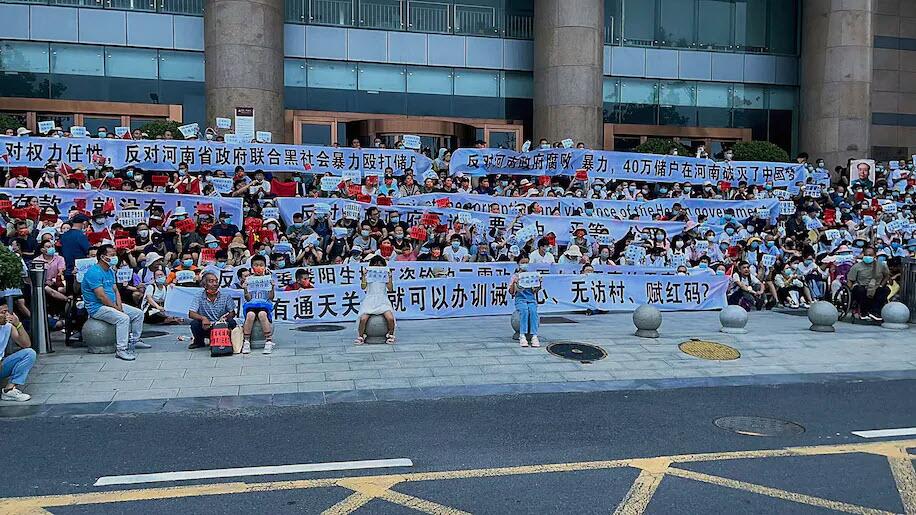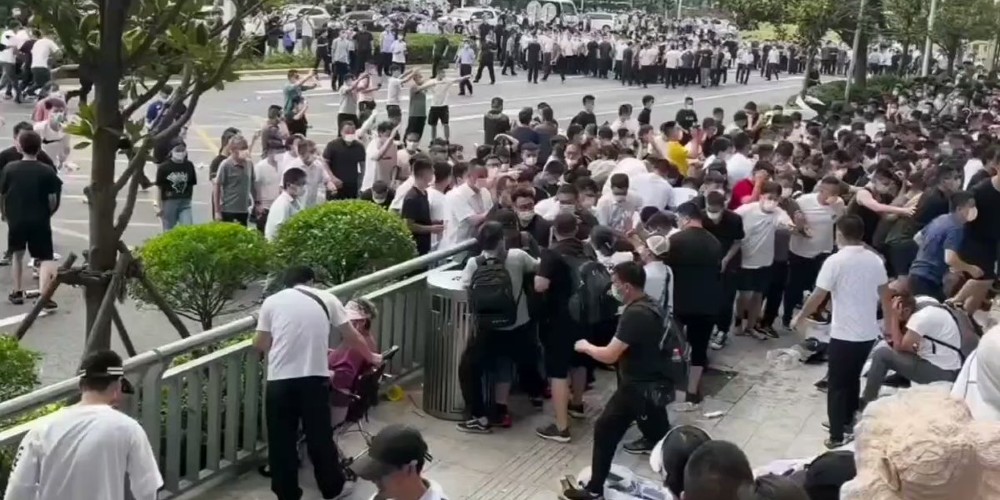While the world of high, and not so high finance, is obsessing over the volatility of cryptos and recent painful losses for overlevered players who – much to the amazement of plain vanilla equity investors – were not bailed out by a magnanimous Fed (which however only rescues stock markets, not cryptos), things in China with its $54 trillion financial system, or more than double the size of assets across US commercial banks, are once again getting heated.
Article by Tyler Durden from Zero Hedge.
-
Learn the TRUTH about Gold IRAs and how most precious metals companies play dirty.

As Reuters reports, a large crowd of angry Chinese bank depositors faced off with police Sunday in the city of Zhengzhou, and many were injured as they were taken away, amid the freezing of their deposits by some rural-based banks.
The banks froze millions of dollars worth of deposits in April, telling customers they were upgrading their internal systems. The banks have not issued any communication on the matter since, depositors said.
According to Chinese media the frozen deposits across the various local banks could be worth up to $1.5 billion and authorities are investigating the three banks.
On Sunday, about 1,000 people gathered outside the Zhengzhou branch of China’s central bank on Sunday to demand action; they held up banners and chanted slogans on the wide steps of the entrance to a branch of China’s central bank in the city of Zhengzhou in Henan province, about 620 kilometers (380 miles) southwest of Beijing.

The protesters are among thousands of customers who opened accounts at six rural banks in Henan and neighboring Anhui province that offered higher interest rates. They later found they could not withdraw their funds after media reports that the head of the banks’ parent company was on the run and wanted for financial crimes.
Videos and photographs on social media showed depositors waving banners and throwing plastic bottles at approaching security guards who then roughly dragged some of the protesters away.
Citizens storm the Bank of China in Zhengzhou over bank account freezes. Banks froze millions of dollars in deposits last April, simply explaining to savers that they need to upgrade their internal systems. Since then, customers have not received any kind of communication. pic.twitter.com/XS9zuXRuEK
— RadioGenoa (@RadioGenoa) July 10, 2022
Besides uniformed police, there were the teams of men in plain T-shirts. A banking regulator and a local government official arrived, but their attempts to talk to the crowd were shouted down.
“We came today and wanted to get our savings back, because I have elderly people and children at home, and the inability to withdraw savings has seriously affected my life,” said a woman from Shandong province, who only gave her last name, Zhang, out of fear of retribution. Zhang and another protester, a man from Beijing surnamed Yang, told the AP the protesters had heard from the officials before and don’t believe what they say.
The police then announced to the protesters from a vehicle with a megaphone that they were an illegal assembly and would be detained and fined if they didn’t leave. Around 10 a.m., the men in T-shirts rushed the crowd and dispersed them. Zhang said she saw women dragged down the stairs of the bank entrance. Zhang herself was hit, and said she asked the officer, “Why did you hit me?” According to her, he responded: “What’s wrong with beating you?”
Yang said he was hit by two security officers including one who had fallen off the stairs and mistakenly thought in the chaos that Yang had hit or pushed him.
https://twitter.com/Qwaszx179730654/status/1545957851021004800
“Although repeated protests and demonstrations don’t necessarily have a big impact, I think it is still helpful if more people get to know about us, and understand or sympathize with us,” Yang said. “Each time you do it, you might make a difference. Although you will get hit, they can’t really do anything to you, right?”
“I feel so aggrieved I can’t even explain it to you,” Zhang, 40, told Reuters. Zhang said he had been hoping to retrieve about 170,000 yuan ($25,000) deposited with one of the banks, the Zhecheng Huanghuai Community Bank.
Zhang said he had suffered injuries to his foot and thumb, and was taken away by four unidentified security personnel at around midday. Security personnel outnumbered protesters by around three to one, he said.
“They did not say they would beat us if we refused to leave. They just used the loudspeaker to say that we were breaking the law by petitioning. That’s ridiculous. It’s the banks that are breaking the law.”
This is huge. Don't know how this will end. Henan bank is NOT the only one that is having problems with liquidity. All four Chinese banks are having the same issue. Some depositors found they can save and can NOT withdraw money with their bank cards. #bankrun #China #CCP pic.twitter.com/5WYYgpmIWP
— Inconvenient Truths by Jennifer Zeng 曾錚真言 (@jenniferzeng97) July 10, 2022
The banks, which include the Yuzhou Xinminsheng Village Bank and the Shangcai Huimin Country Bank, are under investigation by the authorities for illegal fundraising, the state-run Global Times reported.
The protesters were eventually bused to various sites where Zhang said they were forced to sign a letter guaranteeing they would not gather anymore. Late Sunday, Henan banking regulators posted a short notice on their website saying that authorities are speeding up the verification of customer funds in four of the banks and the formulation of a plan to resolve the situation to protect the rights and interests of the public.
More than 1,000 depositors from across the country had planned to gather in Zhengzhou last month to try to withdraw their money but they were unable to when their COVID-19 health codes, which determine if one can travel, switched to a “no travel” status.






Chinese people!
You are more than Xi’s goons.